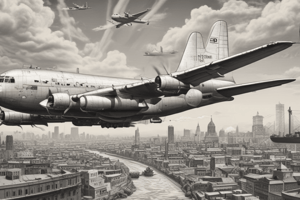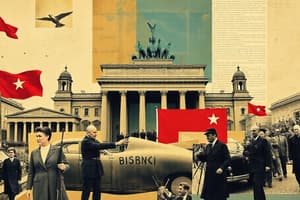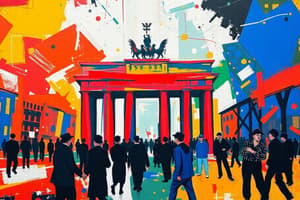Podcast
Questions and Answers
What were the primary reasons for the division of Germany and Berlin after WW2?
What were the primary reasons for the division of Germany and Berlin after WW2?
The primary reasons were to manage Germany's regrowth to prevent future wars and to mitigate the opposing ideologies of the United States and the Soviet Union.
How did the Soviet Union's view of the United States influence their actions in Berlin?
How did the Soviet Union's view of the United States influence their actions in Berlin?
The Soviet Union perceived the U.S. presence as a power grab, mirroring Germany's past aggressive behaviors, which led to their attempts to restrict communication in Western Berlin.
What event marked the escalation of the Berlin Crisis during the late 1950s?
What event marked the escalation of the Berlin Crisis during the late 1950s?
The escalation was marked by the Soviet Union's blockade of Western Berlin, which severed all incoming and outgoing communications.
What symbolic significance did the fall of the Berlin Wall in 1989 hold?
What symbolic significance did the fall of the Berlin Wall in 1989 hold?
What ideology did the United States promote in opposition to the Soviet Union during the Cold War?
What ideology did the United States promote in opposition to the Soviet Union during the Cold War?
What were proxy wars, and how did they relate to the conflict between the U.S. and the Soviet Union?
What were proxy wars, and how did they relate to the conflict between the U.S. and the Soviet Union?
What was the outcome of the Soviet Union's attempts to control Western Berlin?
What was the outcome of the Soviet Union's attempts to control Western Berlin?
In what way did the division of Berlin reflect the broader global tensions of the Cold War?
In what way did the division of Berlin reflect the broader global tensions of the Cold War?
What initiated the Korean War in 1950, and what were the main countries involved?
What initiated the Korean War in 1950, and what were the main countries involved?
Who was the communist leader of North Vietnam, and what role did he play during the Vietnam War?
Who was the communist leader of North Vietnam, and what role did he play during the Vietnam War?
What events led to the United States' involvement in the Vietnam War?
What events led to the United States' involvement in the Vietnam War?
Describe the significance of the Cuban Missile Crisis in 1962.
Describe the significance of the Cuban Missile Crisis in 1962.
How many U.S. soldiers were lost during the Vietnam War, and what was a major consequence of this loss?
How many U.S. soldiers were lost during the Vietnam War, and what was a major consequence of this loss?
What was the outcome of the Korean War in terms of communism in South Korea?
What was the outcome of the Korean War in terms of communism in South Korea?
What was the purpose of the blockade ordered by President Kennedy during the Cuban Missile Crisis?
What was the purpose of the blockade ordered by President Kennedy during the Cuban Missile Crisis?
How did the Vietnam War affect U.S. policy in Southeast Asia after the war ended?
How did the Vietnam War affect U.S. policy in Southeast Asia after the war ended?
In what year did the Cold War officially come to an end, and what was a major factor in this conclusion?
In what year did the Cold War officially come to an end, and what was a major factor in this conclusion?
What role did the Viet Cong play in the Vietnam War?
What role did the Viet Cong play in the Vietnam War?
Flashcards
Post-WWII Germany Division
Post-WWII Germany Division
The division of Germany and its capital, Berlin, into four zones following World War II, with the US, USSR, UK, and France controlling their respective sectors.
US-USSR Ideological Conflict
US-USSR Ideological Conflict
The US and USSR had opposing views about the future of Germany and the world, leading to tensions and conflict.
Berlin Blockade
Berlin Blockade
The USSR's blockade of Western Berlin in 1948, aiming to force the West out of the city.
Berlin Wall
Berlin Wall
Signup and view all the flashcards
Fall of the Berlin Wall
Fall of the Berlin Wall
Signup and view all the flashcards
Proxy Wars
Proxy Wars
Signup and view all the flashcards
Proxy Wars during Cold War
Proxy Wars during Cold War
Signup and view all the flashcards
US-USSR Proxy Wars
US-USSR Proxy Wars
Signup and view all the flashcards
Korean War: First Proxy War
Korean War: First Proxy War
Signup and view all the flashcards
Vietnam War: A Proxy War
Vietnam War: A Proxy War
Signup and view all the flashcards
Cuban Missile Crisis
Cuban Missile Crisis
Signup and view all the flashcards
Cuban Missile Crisis: Consequences
Cuban Missile Crisis: Consequences
Signup and view all the flashcards
Cold War: A Rivalry of Ideologies
Cold War: A Rivalry of Ideologies
Signup and view all the flashcards
Cold War Costs: A Catalyst for Change
Cold War Costs: A Catalyst for Change
Signup and view all the flashcards
The End of the Cold War: December 1991
The End of the Cold War: December 1991
Signup and view all the flashcards
Cold War: Positive Outcomes
Cold War: Positive Outcomes
Signup and view all the flashcards
Cold War Legacy
Cold War Legacy
Signup and view all the flashcards
Study Notes
Berlin Crisis (1958-1961)
- Post-WWII, Germany and Berlin divided into four zones (US, USSR, Britain, France).
- US aimed for German rebuilding to prevent future wars; USSR sought punishment for war damages.
- USSR opposed US presence in Europe, viewing it as power-grabbing.
- Ideological conflict (capitalism vs. communism) exacerbated the division.
- USSR blocked Western Berlin's communications, escalating the crisis.
- Attempts at negotiations failed, leading to the construction of the Berlin Wall.
- Citizens' actions in 1989 dismantled the wall, symbolizing the end of Soviet control.
Containment in Action (Proxy Wars)
- Proxy wars: Conflicts between nations fought through indirect means.
- Korean War (1950-1953): Korea divided into North (USSR) and South (US).
- US supported South Korea to contain communism, resulting in US troop involvement.
- US lost 36,000 soldiers in the Korean War attempt.
- The goal was successful as South Korea remained non-communist.
Vietnam War
- Vietnam initially controlled by France, then Japan.
- Viet Minh declared Vietnamese independence.
- Vietnam divided into North (communist) and South (anti-communist).
- Viet Cong (communist rebels) fought against South Vietnam.
- The US supported South Vietnam to contain communism.
- North Vietnam attack on US warship (Gulf of Tonkin) led to US escalation.
- Soviet Union and China supported North Vietnam.
- US lost over 55,000 soldiers.
- Nixon expanded war to Cambodia and Laos.
- 1973: Peace agreement, US troop withdrawal.
- North Vietnam seized control of South Vietnam in 1975.
- North and South Vietnam unified into a single country.
Cuban Missile Crisis
- Cuba became communist under Fidel Castro.
- Soviet Union placed nuclear missiles in Cuba, a threat to US.
- US discovered missiles and imposed a naval blockade.
- Soviet Union threatened war if USA interfered.
- A compromise averted nuclear war.
- A direct phone line was established between the US and Soviet Union to improve communication.
End of the Cold War
- The immense cost of the Cold War led many nations to shed communism.
- The Cold War officially ended in December 1991.
Studying That Suits You
Use AI to generate personalized quizzes and flashcards to suit your learning preferences.




